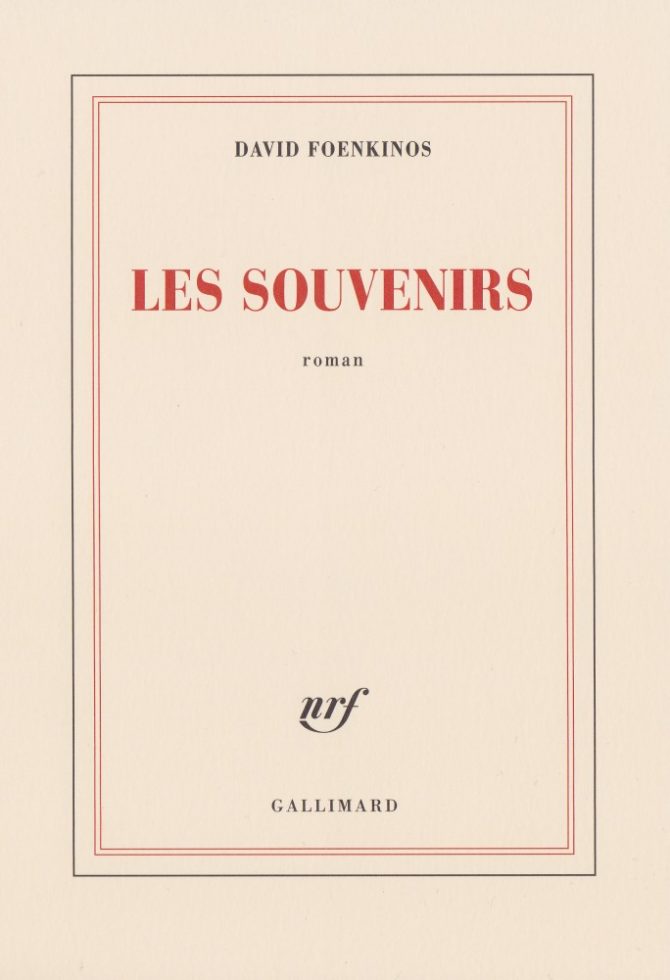David Foenkinos

Audrey Tautou is a rare actress. After the worldwide success of Amélie, she decided she wouldn’t do standard popular flicks, but rather try to choose her roles wisely. And last year the role of the newly widowed Nathalie in La Délicatesse seemed perfectly suited for her: after her husband’s sudden death in an accident, the young woman slowly falls in love with Markus, an eccentric Swede. The story of an odd passion and an exquisite rebirth, La Délicatesse has seduced almost a million viewers in France since last Christmas. But before being made into a film, La Délicatesse was an elegant novel by a young, nearly unknown French writer named David Foenkinos.
Sitting in a café not far from his home in Paris’s 13th arrondissement, easily identified by his glasses and dark curly hair, the 38-year-old writer says he is still stunned by the amazing success of his lighthearted novel—some 800,000 copies sold since it was published in 2009. It’s an “insane” score for his “zany” book, says the one-time guitar teacher, and it never ceases to surprise him.
It isn’t hard, though, to recognize the surefire ingredients of success: elegant writing, catchy aphorisms, overwhelming romanticism. But Foenkinos roundly denies following a formula: “If I knew the winning recipe, I would have applied it much earlier! Don’t forget that just before La Délicatesse, my previous novel had sold only 3,000 copies.” (The book is wittily entitled Qui se Souvient de David Foenkinos?—Who remembers David Foenkinos.)
Whimsy and realism
A huge admirer of Albert Cohen’s Belle du Seigneur, David Foenkinos is also an amateur tennis player. “Actually, I play tennis the same way that I write. I may line up four double faults before letting go with a flamboyant ace!” Although it might seem to be just a quip, the double-fault comparison is fairly accurate—Foenkinos was overshadowed for several years by other writers of his generation, including his friend Florian Zeller (see below).
Critical recognition was slow in coming his way, although the prolific Foenkinos has written a dozen books in the last decade, two of which have been translated into English. First revealed with Le Potentiel Erotique de Ma Femme (The Erotic Potential of My Wife), which was awarded the Prix Roger Nimier in 2004, Foenkinos then somehow went astray, turning out a handful of novels that were quite fun, but far too glib. Heir to the absurdity of Milan Kundera or Witold Gombrowicz, Foenkinos finally realized that he needed “to be taken seriously. I kept the whimsy and lightness of my world, but added a more serious, more realistic background.” It’s a mix he might well have borrowed from some experts he greatly admires: Alain Souchon, François Truffaut and Woody Allen.
His latest novel, Les Souvenirs, is a reminder of that multiple inspiration. The narrator is a modern version of Truffaut’s recurring character Antoine Doinel: a reserved young man, eager to meet his great love. In Les Souvenirs, Patrick works as a night watchman in a hotel, convinced he will find his literary inspiration in that solitude. His great fear is for his grandmother who—despite his objections—has been placed in a retirement home after the death of her husband. His concern is justified: one day, the grandmother disappears. It’s the starting point of an odd pursuit, through which Foenkinos dissects the relationships among generations, and especially our attitudes toward our often-neglected seniors.
Page to screen
“I’ve always been sensitive to old age,” says Foenkinos, “since as an adolescent I was diagnosed with a disease that normally occurs in the elderly, that kept me bedridden in a geriatric hospital.” The experience left him with an acute awareness of death, and a sensitivity to mourning, but it also provoked the urgent desire to live life to the fullest—all of which comes to the fore in the bittersweet romance of Les Souvenirs, making clear—without pretention but with real finesse—the author’s thoughts on time, life, love and family dynamics.
Foenkinos is now the father of a little boy and acknowledges the impact of that new experience on his writing. “Now that I have a concrete link with life, I must be pragmatic. I’m convinced that true heroism resides in the paying of bills on time.” Last year, he managed a major new step in his career, alongside his brother Stéphane, an acclaimed movie casting director. Behind the camera, the Foenkinos brothers directed the adaptation of La Délicatesse for the screen, starring Tautou and the excellent François Damiens in the leading roles. The well-received film earned a César nomination, but it didn’t win.
“It’s been an exhausting experience,” says the first-time director. “But it was also a fantastic adventure that I’d like to repeat, with my brother.” But he doesn’t intend to stop writing. “Writing is a tremendous treasure to me. I hope it is for my readers, too.”
Delicacy, by David Foenkinos, Bloomsbury, 256 pages (also available on Kindle)
A French trio to discover
Florian Zeller
David Foenkinos’s best friend Florian Zeller is one of France’s hottest novelists and playwrights. Aged 33, he has already produced four novels, all of which have been translated into English. Among his works, famed for their controversial and/or romantic topics, the best known may be The Fascination of Evil (Pushkin Press), an exploration of the relationships between the West and Islam, which won the Prix Interallié in 2004. In his new novel, La Jouissance, due out in September, the handsome young author compares a couple’s romance to the construction of Europe.
Nicolas Fargues
Another good-looking author, the 40-yearold Fargues has already enjoyed several careers—as journalist, publisher, director of an Alliance Française center in Madagascar, and even as a model for a Chanel ad. But his main talent resides in his writing, as evidenced by his novel I Was Behind You (Pushkin Press), a semi-autobiographical romance now available in English. The book was a solid success in France, selling more than 300,000 copies. A keen observer of modern society, men’s cowardice and women’s pride, Fargues now lives in London where he’s working on his tenth novel.
Olivier Adam
More discreet than his peers, Olivier Adam might also be the best-loved of contemporary French writers. Born in Paris but now living in Brittany, he was discovered with his first novel, Je Vais Bien, Ne T’en Fais Pas (loose translation: I’m fine, don’t worry), in 2000. Six years later, that story of a desperate girl looking for her missing brother was brilliantly adapted for the screen, and in turn focused the spotlight on Adam’s other novels. Only one has been translated into English so far, the excellent Cliffs (Pushkin Press), a finalist for the 2005 Prix Goncourt. His latest novel, Les Lisières, should be a strong contender for the award next fall.
Find these and other books in our France Today bookstore.
Originally published in the July/August 2012 issue of France Today
Share to: Facebook Twitter LinkedIn Email
Leave a reply
Your email address will not be published. Required fields are marked *



